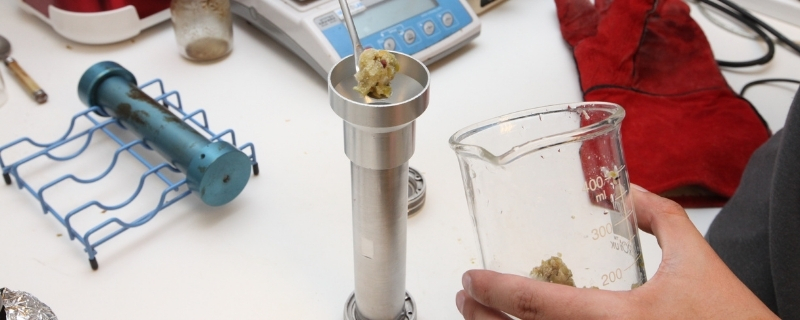
Laboratorio de Extracción de Compuestos de Alto Valor
__________
The growing concern for personal wellbeing has created a growing trend in using natural products, i.e., those mainly derived from plants that provide multiple nutritional and health benefits. Each year, many new functional and fortified foods with bioactive natural compounds, such as polyphenols, are commercialized. Therefore, there are multiple opportunities for the growth of the food industry, the socioeconomic strengthening of the multiple actors involved in using natural products, and the value of the bioactive potential of the not-yet-explored resources in Chile. However, these opportunities simultaneously present significant challenges; the production of natural extracts and isolation of bioactive compounds, as well as their incorporation into food, nutraceutical, and pharmaceutical products, must follow strict standards for sustainability, safety, and quality. The products which are developed must have precise specifications and be certified and scientifically validated. The Laboratory of Extraction of High-Value Compounds (LECAV in Spanish), led by Professor Ricardo Pérez from the Department of Chemical and Bioprocesses Engineering, addresses the development of science and cutting-edge technology key to facing these challenges effectively. Specifically, the mission of LECAV is to conduct high-quality research and create scientific-technological knowledge to sustainably and efficiently obtain natural compounds with proven bioactive properties for the development of functional foods with tangible benefits to meet the individual requirements and regulations of the industry.
LECAV activities address the exploration of natural sources, isolation, functional and chemical characterization of bioactive compounds. Exploration of natural sources is mainly focused on the identification and discovery of plant materials (e.g., fruits, vegetables, herbs, native flora, seaweeds) and agroindustrial wastes (e.g., grape pomace, spent coffee ground, native berry leaves, and apple peels) rich in polyphenols and essential oils. The main goal of this area is to develop a database of natural sources available in Chile whose extracts and by-products have potential bioactive properties of interest for the food, nutraceutical, and pharmaceutical industries (bactericides, fungicides, virucides, antioxidants, antibiotics, and others).
Isolation comprises the design, development, and optimization of pressurized hot water extraction (PHWE) and spinning cone column (SCC) technologies for obtaining polyphenolic extracts and essential oils from selected plant materials and agroindustrial wastes and the subsequent isolation of the bioactive compounds through adsorption and membrane filtration. Process optimization is carried out by developing and applying phenomenological models based on mass and energy balances, phase equilibria, and transport phenomena principles. The description of phase equilibria (vapor-liquid and solid-liquid equilibria) of complex natural mixtures is mainly addressed by thermodynamic models such as those based on SAFT equations of state.
Functional characterization focuses on analyzing and validating the bioactive properties of essential oils and polyphenolic extracts obtained by SCC and PHWE through in vitro studies, mainly antioxidant capacity (e.g. ORAC, DPPH, FRAP) antimicrobial activity (e.g., the halo of inhibition test) assays. Also, this area seeks to define potential applications of the obtained essential oils and extracts in designed food matrices.
Chemical characterization is focused on identifying, quantifying, and describing particular polyphenols and other bioactive compounds present in essential oils and natural extracts of interest for the food industry. Advanced analytical techniques and equipment are used, such as spectrophotometric, GC-MS, and HPLC-MS analyses.
Finally, LECAV does not limit its activities to the research of plant species and their application in foods. The medium-to-long-term considers their application in cosmetics, study microorganisms as a natural source, and address the development of veterinarian products for animal health and pesticides for agriculture. Hence, LECAV seeks to become a leading scientific-technological laboratory focused on the research of a wide variety of natural products and the development of integrated solutions which contribute to resolving complex challenges and problems in the food, cosmetic, agricultural, pharmaceutical, and veterinarian industries which have a direct impact on the wellbeing of individuals, animal health and protection of the environment.